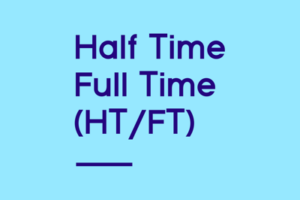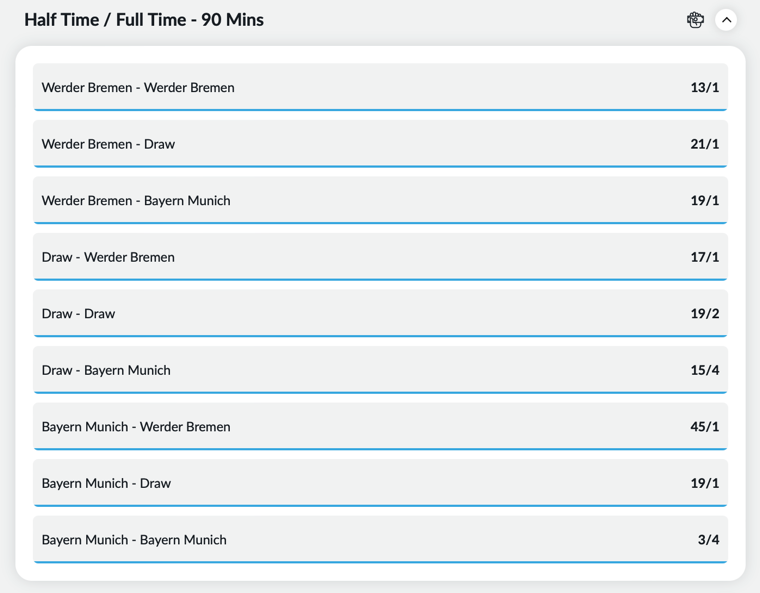 Bookmakers treat football matches as lasting 90 minutes, made up of two halves of 45 minutes apiece. That might sound obvious, but it means that, with the majority of bets, it is the scoreline at the end of the game that matters and anything that happens in extra-time or a penalty shootout doesn’t count.
Bookmakers treat football matches as lasting 90 minutes, made up of two halves of 45 minutes apiece. That might sound obvious, but it means that, with the majority of bets, it is the scoreline at the end of the game that matters and anything that happens in extra-time or a penalty shootout doesn’t count.
It also means that there are some bets that you can place based on matches taking place over two halves, with one of those being the Half-Time / Full-Time market, which is a bet about which team will be winning, if any, at half-time and then again at full-time.
The Half-Time / Full-Time (HT/FT) Market
When it comes to betting on the Half-Time / Full-Time market, you might think that it is a bit confusing. You needn’t worry, though, as it isn’t anywhere near as complex as it sounds. In essence, you have to decide what you think the intermediate result of the match will be at half-time and what you think the eventual result of the game will be 45 minutes later. In other words, you don’t need to figure out what the score will be, just whether or not one of the two teams taking part in the game will be ahead of the other when the referee blows for half-time and who the eventual winner will be.
Here is a look at the list of possible Half-Time / Full-Time options that your chosen bookmaker is likely to offer you for a match. In this instance, we’ve chosen a random example of the Merseyside derby as the game that we’re looking at so that you can see how it would be written by bookmakers. Obviously you just need to substitute the names of the two teams for the teams taking part in the match that you’re betting on. We have also added some random examples of odds so you can imagine how it might look:
| HT/FT Option | Odds |
|---|---|
| Liverpool / Liverpool | 4/5 |
| Liverpool / Draw | 20/1 |
| Liverpool / Everton | 100/1 |
| Draw / Liverpool | 11/4 |
| Draw / Draw | 6/1 |
| Draw / Everton | 20/1 |
| Everton / Liverpool | 22/1 |
| Everton / Draw | 22/1 |
| Everton / Everton | 25/1 |
Some bookmakers might display it as Home / Draw, say, or Away / Away, rather than using the team names, but the idea still the same: the selection before the / is who you think will be leading at half-time, whilst the one after the / is what you think the full-time result will be. In the example above, the bookmakers consider Liverpool to be massively superior to Everton when playing at Anfield, which is why the odds on them winning both halves are relatively low whilst the odds on Everton coming from behind to win are so high.
Why Bet on It?

One of the things you might be wondering is why you would even want to bet on the Half-Time / Full-Time market in the first place. The answer comes in the form of increased value. Realistically, bookies are a lot less willing to offer good odds on the Match Result market, simply because there are far fewer possible outcomes. That is to say, it can either be a home win, an away win or a draw, so there are only three things bookies need to consider. When it comes to the Half-Time / Full-Time market, however, there are nine possible outcomes.
That means that there is more of a chance for your bet to go wrong, which means the bookmakers stand more of a chance of winning your money. The match could finish as 5-0 to Liverpool, for example, so the Reds might be dominant in the game, but all five goals could come in the second-half, so a Half-Time / Full-Time bet on Liverpool / Liverpool would be a losing one. As a result, you’ll get better odds on the wager than you would on the straight Match Result, which is why many punters chose to place such a bet instead of the more straight-forward one.
The main thing to remember in all of it is that the bet you are placing is on the 90 minutes of the match. In other words, if you’re betting on a cup match and it ends up going to extra-time or extra-time and penalties, it is the result at the end of the second-half that will count towards your bet. A wager on Liverpool / Everton could still be a winner if, for example, it was the second-leg of a cup and Liverpool had won the first-leg 1-0 but lost the second-leg 1-2, sending the game into extra-time but seeing your Half-Time / Full-Time bet be successful.
